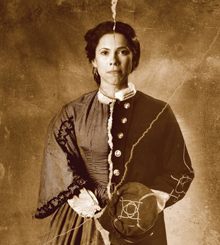One of an estimated 1,000 women who fought in the Civil War, Loreta Velazquez disguised herself as Lieutenant Harry T. Buford and served in the Confederate Army, only to become a double agent for the Union.
It’s one of the most compelling stories from the war, yet it’s been largely forgotten.
Well, maybe not forgotten.
“Systematically erased,” said filmmaker Maria Agui Carter following a screening of her documentary, Rebel, at the Ogden Museum of Southern Art last Friday night.

In the documentary Rebel, actress Romi Dias portrays Loreta Velazquez as a woman at left, and passing as Civil War Lt. Harry T. Buford on the right. (Photo by Gerard Gaskin)
Through a mixture of dramatic acting, archival material, and interviews with historians, Rebel takes us from Velazquez’s childhood in Havana, as a Joan of Arc-admiring tomboy; to New Orleans where she was sent to live with an aunt in the French Quarter to learn sewing, music, and dance; and ultimately into battle for the Confederacy, then espionage for the Union.
It’s based on Velazquez’s own words — her 600-page memoir, A Woman in Battle — which caused a sensation when it was published in 1876 and remains in print today.
But A Woman In Battle was “dangerous,” said Carter. “It talked about the corruption of wartime society. It talked about women thinking for themselves and being a part of public policy and the public world at a time when they were supposed to be — if they were supporting the war –darning, or knitting socks, not donning the uniform.”
Moreover, Velazquez’s narrative didn’t fit the carefully reconstructed historical record being created under the leadership of those like Confederate General Jubal Early. A powerful figure of his time, Early once said that while the Confederacy may not have won with the sword, they would win with the pen. “So the idea was to kind of create this mythological history of the ‘Lost Cause’, which is still a romance that lives today,” said Carter. “And she was corrupting the story.”
Early questioned aloud why a woman from Cuba didn’t have a Spanish accent; though, of course, Velazquez had immigrated to New Orleans as a young girl. As for Velazquez’s detailed descriptions of camp life during the war, the General dismissed this knowledge as something a ‘camp follower’ or, ‘prostitute’ in the parlance of that time could possess. This battle over the politics of remembering is also covered in the second half of Rebel.
Unfortunately, General Early’s efforts to snuff out Velazquez’s story were largely successful, as her story generally became dismissed as a hoax. And, as of 2002, Carter herself was under this false impression.
“I’d heard about her as a mythical figure,” said Carter, “but I came across some articles by a senior military archivist at the National Archives and I called up the archivist and asked, ‘Why do you talk about her as a real person? I thought she was a hoax.”
The archivist invited Carter to come to the Archives to see documentation for herself, including pay stubs for her spying activity for the Union.
“I said, ‘Oh my god, this is a real person’,” said Carter. “’Why haven’t I heard about her and why haven’t I heard about the almost thousand other women who fought in the American Civil War?’”
Carter began her research for Rebel as a Rockefeller Fellow at Tulane’s Stone Center for Latin American Studies in 2002 and would work on and off on the film for the next decade.
“I actually feel like I was very lucky that it took this long,” Carter said. “I had to keep recommitting every time I came back to it, between paying jobs. I had to get recommitted to the story, questioning myself — ‘Am I telling the best story?’ Over the years, I think I began telling a much better story than the first ideas and thoughts that I had about it.”
But there is much more about Velazquez’ life that needs to be uncovered and recovered, and Carter continues on that search. While much about her later years isn’t known, including where she died, new documents have recently surfaced, and Carter is hoping to launch a website in February and will be posting some of the new information.
“I’m hoping that with so much interest in genealogy these days, that more information will come out about her,” said Carter.
 NOLAbeings Multimedia artist Claire Bangser created NOLAbeings as a portrait-based story project that marries...
NOLAbeings Multimedia artist Claire Bangser created NOLAbeings as a portrait-based story project that marries...  Voodoo in New Orleans: Reviving history: New Orleans fortune telling This article takes a deep dive into the history of Voodoo in New Orleans, its hybridization with Catholicism, and its present-day place in the city's culture. The author visits fortune-tellers in the French Quarter, using their guidance as a tool for introspection rather than a deterministic predictor of the future. Through her experiences in New Orleans, the author feels a mystical connection to both the past and the future.
Voodoo in New Orleans: Reviving history: New Orleans fortune telling This article takes a deep dive into the history of Voodoo in New Orleans, its hybridization with Catholicism, and its present-day place in the city's culture. The author visits fortune-tellers in the French Quarter, using their guidance as a tool for introspection rather than a deterministic predictor of the future. Through her experiences in New Orleans, the author feels a mystical connection to both the past and the future. 